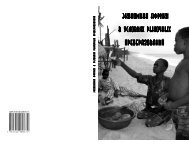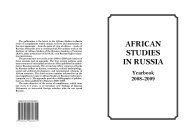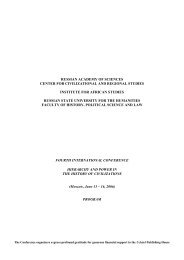L. Fituni, I. Abramova Resource Potential of Africa and Russia's ...
L. Fituni, I. Abramova Resource Potential of Africa and Russia's ...
L. Fituni, I. Abramova Resource Potential of Africa and Russia's ...
You also want an ePaper? Increase the reach of your titles
YUMPU automatically turns print PDFs into web optimized ePapers that Google loves.
to the downfall <strong>of</strong> the Egyptian President Hosni Mubarak. In a domino-effect,<br />
they enflamed public disorders <strong>and</strong> widespread, sometimes<br />
bloody, unrests in Algeria, Yemen, Jordan, Iran, Bahrain,<br />
Libya <strong>and</strong> Morocco. The seemingly spontaneous demonstrations <strong>and</strong><br />
uprisings received crucial technological, infrastructural, political <strong>and</strong><br />
organizational support from the West.<br />
This support was crucial primarily in two aspects. One was the<br />
steadily increasing political pressure upon the <strong>Africa</strong>n <strong>and</strong> Middle<br />
Eastern heads <strong>of</strong> state <strong>and</strong> governments by the leaders <strong>of</strong> virtually<br />
all Western democracies, who (a) expressed their support to the<br />
“uprising masses” <strong>and</strong> (b) restrained the local governments from<br />
taking any decisive measures to stop the demonstrations. The second<br />
was the provision <strong>of</strong> technical capabilities <strong>and</strong> financial support<br />
for spreading the unrests beyond their original limited nuclei.<br />
The media used for those purposes were formally “nobody’s in<br />
particular” (Internet, mobile phones, social networks, email, satellite<br />
TV <strong>and</strong> short-wave radio, etc). However, it is an open secret,<br />
that the so called “social” media <strong>and</strong> many providers <strong>of</strong> information<br />
services are closely connected <strong>and</strong> dependent in many visible<br />
<strong>and</strong> invisible ways upon the <strong>of</strong>ficial authorities <strong>and</strong> their agencies.<br />
The latter allow them to use servers, communication capabilities,<br />
manage the transcontinental networks or allow using satellites for<br />
their purposes.<br />
The reality <strong>and</strong> the level <strong>of</strong> such influence is clearly visible in<br />
the situations, when the flow <strong>of</strong> “free’ information is considered to<br />
be undesirable by the West. The recent examples <strong>of</strong> governments’<br />
capabilities to harness the free <strong>and</strong> “unmanageable” social media<br />
were the uniform controlled reporting on the wars in Iraq, Afghanistan,<br />
or Georgia.<br />
In the case <strong>of</strong> Middle Eastern revolutions the West not only took<br />
a “pro-change” position, cold bloodedly betraying its decades-old<br />
allies <strong>and</strong> supporters (like moderates Ben Ali in Tunisia, or Mubarak<br />
in Egypt). Very serious financial resources were in the least not prevented<br />
from reaching the opposition. It is unclear, for example, what<br />
amounts <strong>of</strong> funds were paid to secure the expensive long distance<br />
international dial-up connections to telephone numbers in France,<br />
42







